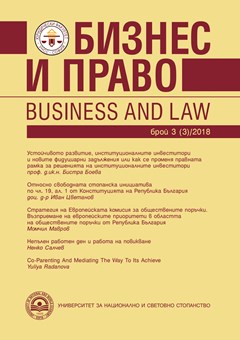Непълен работен ден и работа на повикване
Author: Ненко Салчев
Nenko Salchev
Abstract
This article examines the extent and nature of part-time work and how it has changed over time. It examines factors influencing decisions of enterprises and individuals to offer and accept part-time work. Part-time work has become an important form of employment, which has grown continuously since the 1970s to the present. Its benefits are related to the prerequisites for reconciliation of work-life balance and the possibility of including in the labour market some groups of the society who are unable to work full-time. Part-time work allows employers to reduce their expenses for wages and gives them flexibility in organizing the work in enterprise. Its widespread use in certain cases entails risks of reducing the general level of worker’s protection, deteriorating working conditions, discrimination and even marginalizing part of the employees. Thus the possible continuation of the trend towards more flexible working time patterns should be pursued through a holistic approach combining certain aspects of employment, social security and tax legislation. In this way, the rights of employees will be guaranteed and expanded and also the negative effect of reducing the protection of workers and the transfer of economic risks to them will be limited.
Special attention is paid to “on-call” and “zero-hours” labour contracts, in which there is no contractual minimum length of working time. Indicated are the negative impacts on the employee’s interests in the use of these types of labour contracts and how they transfer the economic risks from the employer to the employees. It is clearly stated why these types of labour contracts are not eligible under Bulgarian labour legislation and how their possible regulation could lead to the violation of the workers’ subjective rights.
In conclusion, it is assert that in the Bulgarian system of labour relations, part-time work has the necessary balance to protect the interests of the parties. Employers in Bulgaria have the opportunity to take advantage of various forms of work organization in the enterprise, with only one of them being part-time work. The use of part-time work requires good planning of work processes and knowledge of the nature of business activity in order to ensure maximum efficiency of work and to reduce labour costs, which is the essence of good business management.

